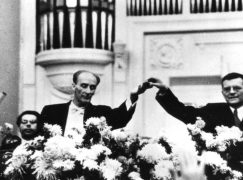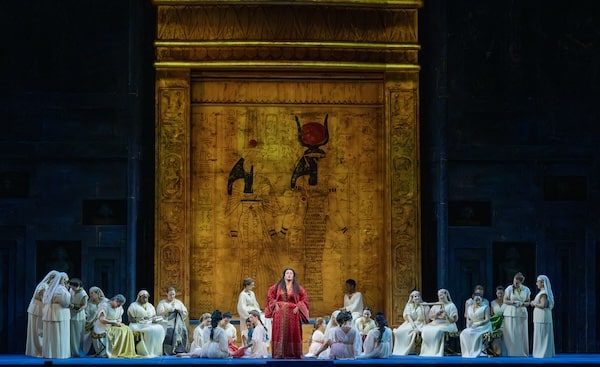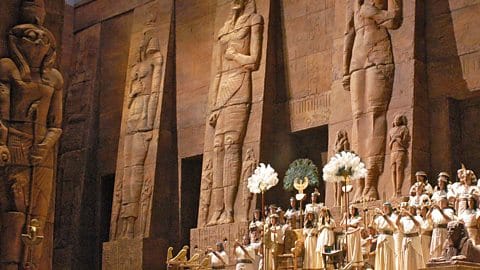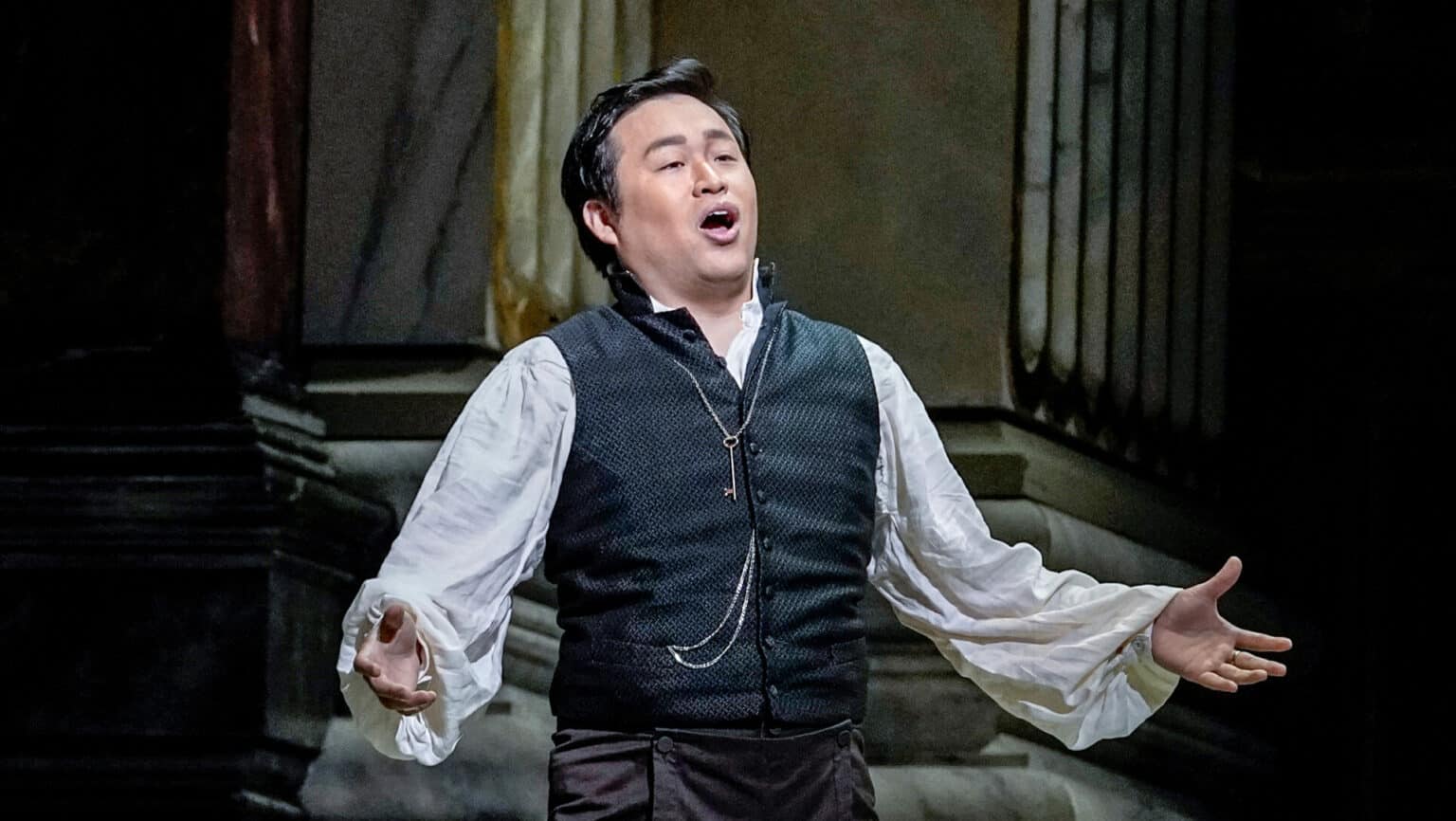Was Mravinsky #1 in Shostakovich?
mainThe rare memoir of Evgeny Mravinsky that we published earlier established the Leningrad conductor as the premier Shostakovich interpreter.
Most of his recordings are impressive. This one less so.
Kurt Sanderling told me once long ago that he would take over each new symphony with the Leningrad Philharmonic after the first or second performance.






“Most of his recordings are impressive. This one less so.”
Copy and paste into any article about any great conductor. Even Furtwängler, Walter, and Klemperer. And Carlos Kleiber (that Sue goes without saying)!
Is it me, or is Kurt Sanderling really just an unmemorable mediocrity? I’ve never heard a performance of his that I thought was particularly outstanding, including live ones here in Boston. Even his so-called “tremendous” performance of Bruckner’s 7th never grabbed me as it has others.
Herr Doktor, his Shostakovich 8th (recorded in 1976, with the Berliner Sinfonie-Orchester) may be the best of them all. You should give it a try! This later performance is also very fine: https://youtu.be/doaRq-Wifvw
You have answered your own question: it is you.
It’s certainly possible that it’s me. I will take a quick listen to Sanderling’s Shostakovich 8. But it will have to be really special to top Mravinsky’s live performance that I have thought of as pretty definitive.
But still, having heard Sanderling live 3 times, and in various recordings, so far I have heard competency, not greatness.
I thought I already replied to this but somehow my comment disappeared.
In any case, I said that I now enjoy Sanderling’s music making much less that I used to, especially – but not exclusively – his more recent recordings (i.e. post 1980). There are exceptions, his Shostakovich cycle for instance.
This recording is significant as it allows us to hear the Fifth so soon after the premiere, albeit it was made in Moscow and involved the orchestra traveling through to the capital and the recording conditions were not so good. I actually think all of Mravinsky’s recordings are important and show how great a conductor he was, bringing out the depth of the score revealing its subtext more than anyone else, and really Sanderling was not in my opinion in the same league, this is borne out by his own recordings of the same repertoire. Indeed Mravinsky conducted Shostakovich’s Fifth more times than did Sanderling when he was there. This is all in my book about Mravinsky published in 2005.
Why didn’t he conduct Babi Yar? And why didn’t Shostakovich make any recordings of his own symphonies!?
Mravinsky didn’t perform the 13th because his then wife was diagnosed with a fatal illness, also he was on tour for almost 2 months in N America when Shostakovich wanted it premiered quickly(it was premiered by Kondrashin in December 1962) , and he may well have performed it later but he was reluctant to work with choirs, the last time he worked with a choir was in 1952.
To Rob, in the previous post about Mravinsky, I commented on this. While political motives were rumoured, Mravinsky´s close family friend (and later his wife), the flutist Alexandra Vavilina, came forward to explain that Mravinsky refused not for political reasons but because his wife Imma was gravely ill with bone cancer and he was incapacitated with grief. She died in 1964. Babi Yar was premiered in 1963.
“Why didn’t Shostakovich make any recordings of his own symphonies!?” – Shostakovich mentions casually is “Testimony” that he conducted one of his symphonies, but reached a conclusion of something like “why bother, let others do it.” He gives examples of other composers who made a complete mess trying to conduct their own works. You may draw your own conclusions what he meant, but I get the feeling he realized he wasn’t made for conducting.
The only Russian conductor who conducted a Shostakovich symphony during his lifetime and gave us the best version of it is IMO Kondrashin in Babi Yar. I don’t think the other symphonies were understood adequately or received the best readings by Russian conductors during his lifetime. The best 4th during his lifetime was Ormandy’s. I don’t think anyone else even understood the 4th for decades. When I listen to, for example, Kondrashin’s recordings of the symphonies I hear readings that reflect how they sounded to Russian ears back then when they were new music – I don’t think most of them were fully digested yet. If you watched videos of Shostakovich speak, Kondrashin’s readings (13 excepted) sound to me like he was applying Shostakovich’s nervously fast and halting speech patterns to the scores. I think he heard nervous, agitated writing, usually not much more. Bottom line, performances of Shostakovich’s works have been improving, and the best versions come from current conductors, Russian or otherwise, 13 excepted.
I wouldn’t wanto to be without the Kondrashin cycle (or the Haitink, for that matter) but the one I turn to most often is the Barshai. Barshai was personally close to Shos, perhaps more than aqny other conductor of the time and his performances have for that reason an added ring of authenticity. And for recordings of single symphonies. does anyone remember the Efrem Kurtz Ninth? That was my frst introduction to Shostakovich and for me still the benchmark.
He said this was his son Thomas’s Symphony, Thomas having conducted the German Premiere, the words in German.
Less Impressive. One can be shot by Stalin for playing that music. A bit more dangerous than attacking Dutoit or Levine Mr, Lebrecht?
One memoir I read said when he died in 1988, the score to Shostakovich´s Symph. 5 was open on his desk. He had been studying it.
This is all the more remarkable as 1988 was, in fact, long before his actual death. 🙂
?? Mravinsky died Jan. 19, 1988. https://en.wikipedia.org/wiki/Yevgeny_Mravinsky
The score to Shost 5 was open on his desk when he died.
Do you have some evidence to the contrary? Maybe he´s like Elvis & people keep seeing him after he died.
Have any good post 1988 Mravinsky sightings to share with us, Jobe?
I am sorry, I thought you were referring to Sanderling! Cast the first stone.
Thanks for the video. Wretched sound. Scrappy strings. But it settles one thing for me: the coda should be slow. The Bernstein tempos are wrong. Great conductor. Tchaik 4, 5, 6 are pretty special.
Of course, the coda is slow! That’s how Shostakovich wrote it.
The question is, slow 2 or slow 4? In my experience, conducting it mostly in slow 2 may be quite effective if and when it is done well.
The score says eighth note = 184. What he should have written was quarter = 92, which is a bit faster actually than Mravinsky is taking it. Doing it in 4 doesn’t feel right and most conductors I’ve played it with do go in to. But some go much quicker, like Bernstein and some of his followers. Others got the message from Volkov’s book Testimony and, following Rostropovich among others, take it at an excruciatingly slow tempo. But given that Mravinsky was doing this early, with the composer at hand gives credence that the slower tempo is correct, like it or not. For those of us who first encountered the 5th in the 60s with Bernstein and Ormandy, the slower tempo just feels so wrong – yet, it is what’s in the score. What I do know is that if you play upper winds, upper strings the final page is a wretched thing to play at 184; that damned A over and over and over.
Shostakovich tempo markings are notoriously incorrect, mostly because the instrument he used was broken, and the slow tempo for the finale ending is terribly difficult for the musicians to play, Mravinsky’s tempo is correct as he worked on the 5th with the composer, but there is nothing political, it is more like the composer as the hero in the symphony showing his victory over adversity.